Modern State of Fertility 2019
Our top takeaways

1. It takes two to tango—but women feel they’re the only ones bearing the burden
Insight: Although fertility is often misconstrued as “a woman’s problem”, male factors contribute to infertility. A much-cited study found that around 50% of all cases of infertility are due to female factors alone, 20-30% are due to male factors alone, and the remaining 20-30% are due to a combination of male and female factors.
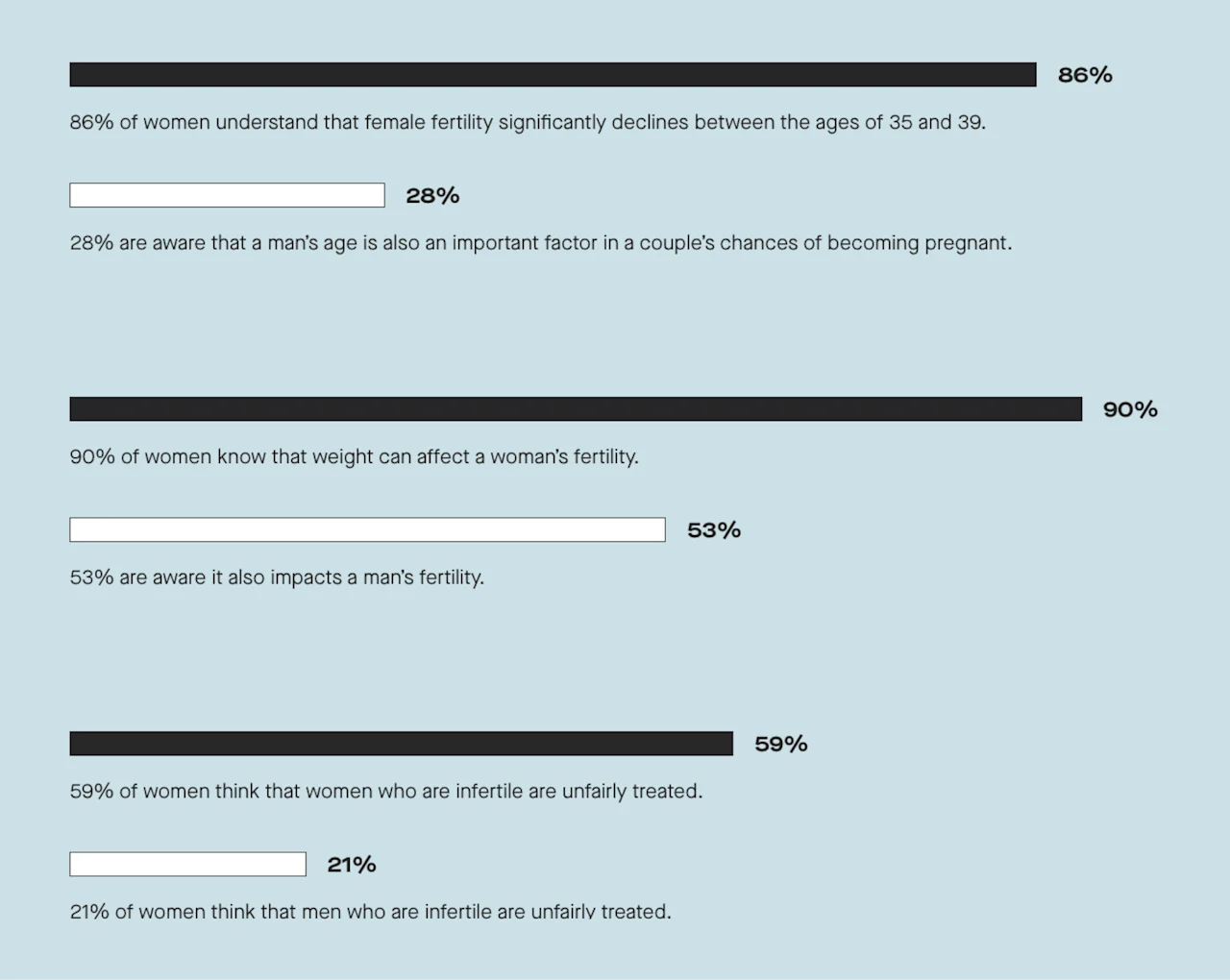

2. Even age, one of the most commonly used indicators of fertility, is still misunderstood
Insight: Few women understand how much aging negatively impacts natural conception. For women, fertility declines significantly after around age 35, and for men, fertility declines significantly after age 45.
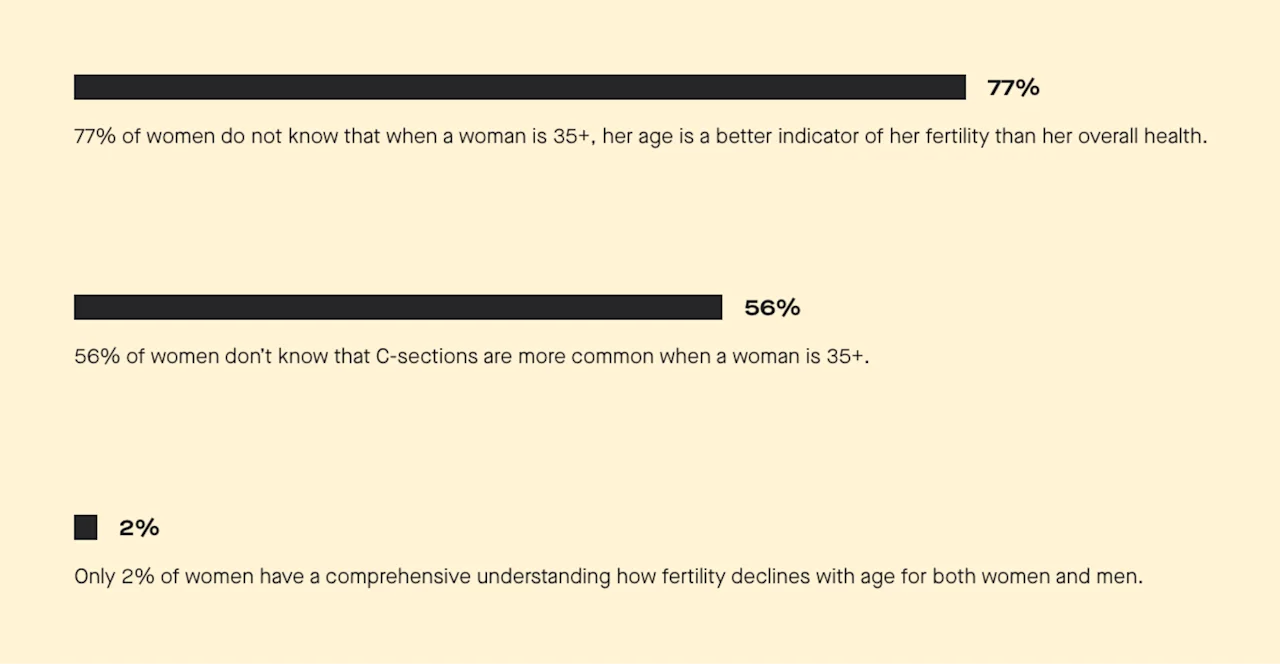

3. In-vitro fertilization (IVF): it's not so straightforward
Insight: Most women think that IVF is a highly successful procedure with few complications. The reality is that IVF is not always successful, usually requires multiple tries, and can involve risks to mothers and babies.
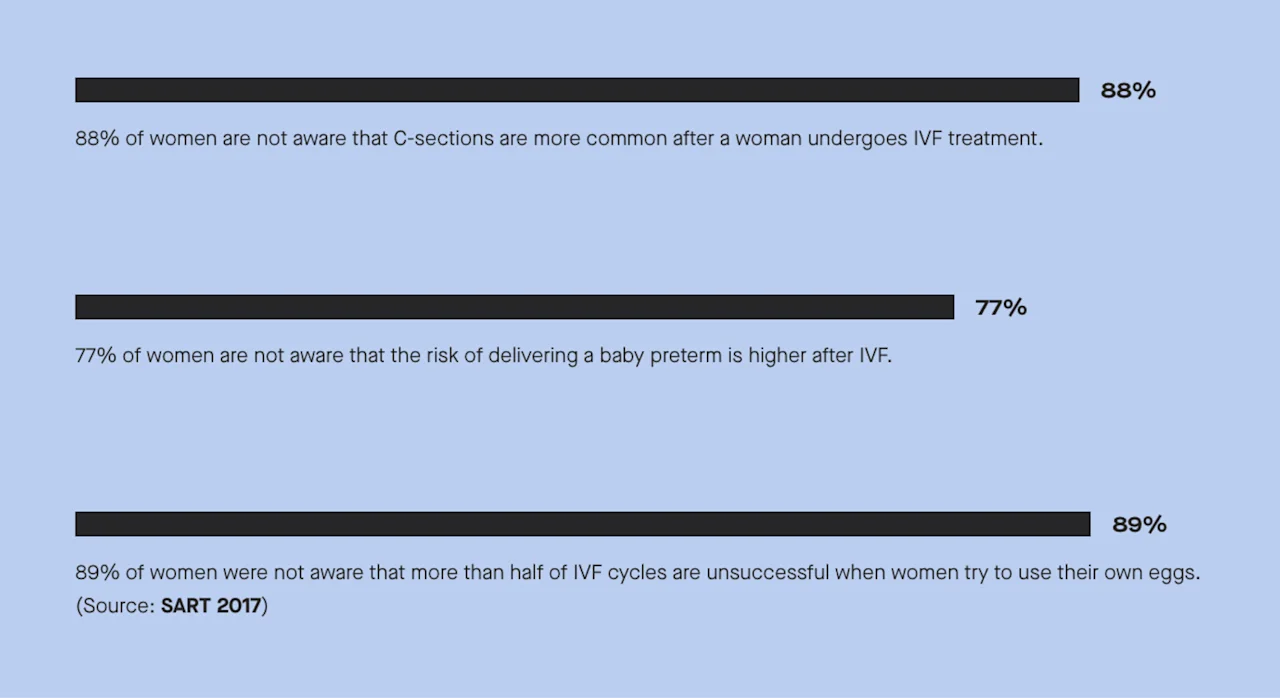

4. It’s 2019. We need more than “just wait and see.” We need education.
Insight: 57% of women would like information from a fertility specialist, but there are only about 500 infertility clinics nationwide.
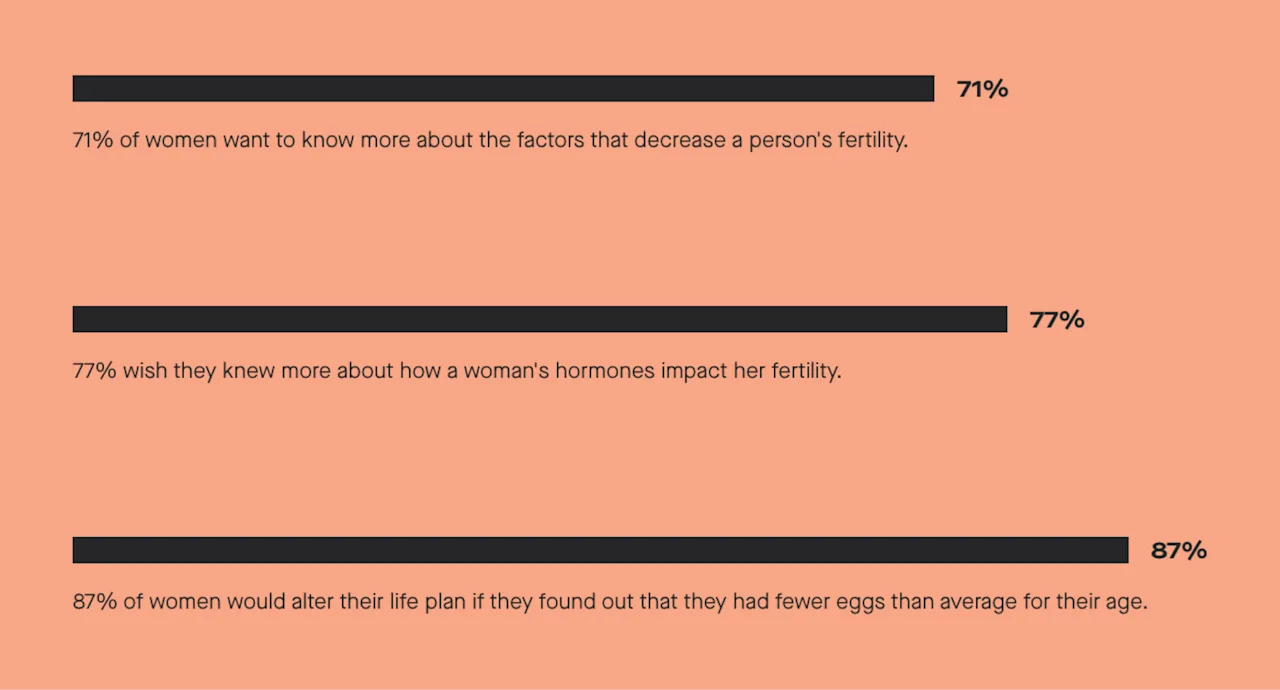
“I had twins with the help of IVF. When people talk to me about them and ask questions, I openly tell them how they were conceived. If they are judging me for it, then I haven’t noticed because frankly I don’t care.”
Extended survey results
Let’s get the information straight and uncover what women are thinking and feeling about fertility treatments, stigmas, information sources, and more.
General Fertility Knowledge
Insight: 1 in 6 heterosexual couples are infertile.

Age knowledge
Today, 2% of women have a comprehensive understanding of age’s impact on fertility (meaning, they scored 100%), and 47% answered correctly to about half of the survey questions about age.
Insight: Female fertility significantly declines between the ages of 35 and 39.

Male fertility significantly declines between the ages of 45 and 49.

Insight: After age 35, a woman is more likely to have medical problems during pregnancy.

Insight: Women who are transitioning into menopause have a lower chance of becoming pregnant.

Insight: When a woman is over 35 years old, cesarean section (C-section) is more common.

Insight: When a woman is over 35 years old, age is a better indicator of fertility than overall health.

Insight: When a man is over 45 years old, there is a significant decline in the ability to impregnate his partner.

Insight: A man's age is an important factor in a couple's chances of becoming pregnant.

Hormones knowledge
Today, 57% of women have a comprehensive understanding of how hormones impact fertility.
Insight: A woman's hormone levels provide information about her fertility.

Insight: The number of eggs a woman has in her ovaries decreases from birth to puberty.

Insight: Taking oral contraceptive pills does not "save" eggs.

Risk Factors knowledge
Today, 57% of women have a comprehensive understanding of how hormones impact fertility.
Insight: Smoking has an impact on a woman's fertility.

Insight: Smoking cigarettes or marijuana can reduce the quality of a man's sperm.

Insight: A woman's weight affects her chances of conceiving.

Insight: A man's weight impacts his likelihood of impregnating his partner.

Insight: People who have had a sexually transmitted infection have an increased risk of reduced fertility.

Insight: Having an abortion does not reduce a woman's future fertility.

Insight: Taking hormonal birth control (for example, pill, patch, IUD) for more than five years does not reduce a woman's fertility.

Hormone Blood Tests Knowledge
Only 8% of women have a comprehensive understanding of the importance of hormone blood tests for understanding fertility.
Insight: Hormone blood tests can be used to estimate the number of eggs a woman has in her ovaries.

Insight: Hormone blood tests can be used to understand potential outcomes for egg-freezing and in-vitro fertilization.

Insight: Hormone blood tests can detect if a woman has ovulated (meaning her ovaries have released an egg that month).

Insight: Hormone blood tests can be used to estimate when a woman will reach menopause.

Fertility Treatments Knowledge
Only 0.9% of women have a comprehensive understanding of IVF fertility treatments.

Insight: Most women or couples are not able to get pregnant after one IVF treatment.

Insight: The total cost of one cycle of IVF treatment is more than $5,000 USD.

Insight: C-sections are more common after a woman undergoes IVF.

Insight: the risk of delivering a baby preterm is higher after IVF.

Insight: more than half of IVF cycles are unsuccessful when women try to use their own eggs. (Source: SART 2017)

“People who know little about my situation sometimes feel the need to tell me EXACTLY what to do about it. It is hard enough to be infertile without that unsolicited advice.”
Information Discrepency
If knowledge is power, then women are ready for it. (But we knew that).Women want more information, particularly about factors that decrease a person’s fertility, how their hormones impact their fertility, and hormone blood tests for women.

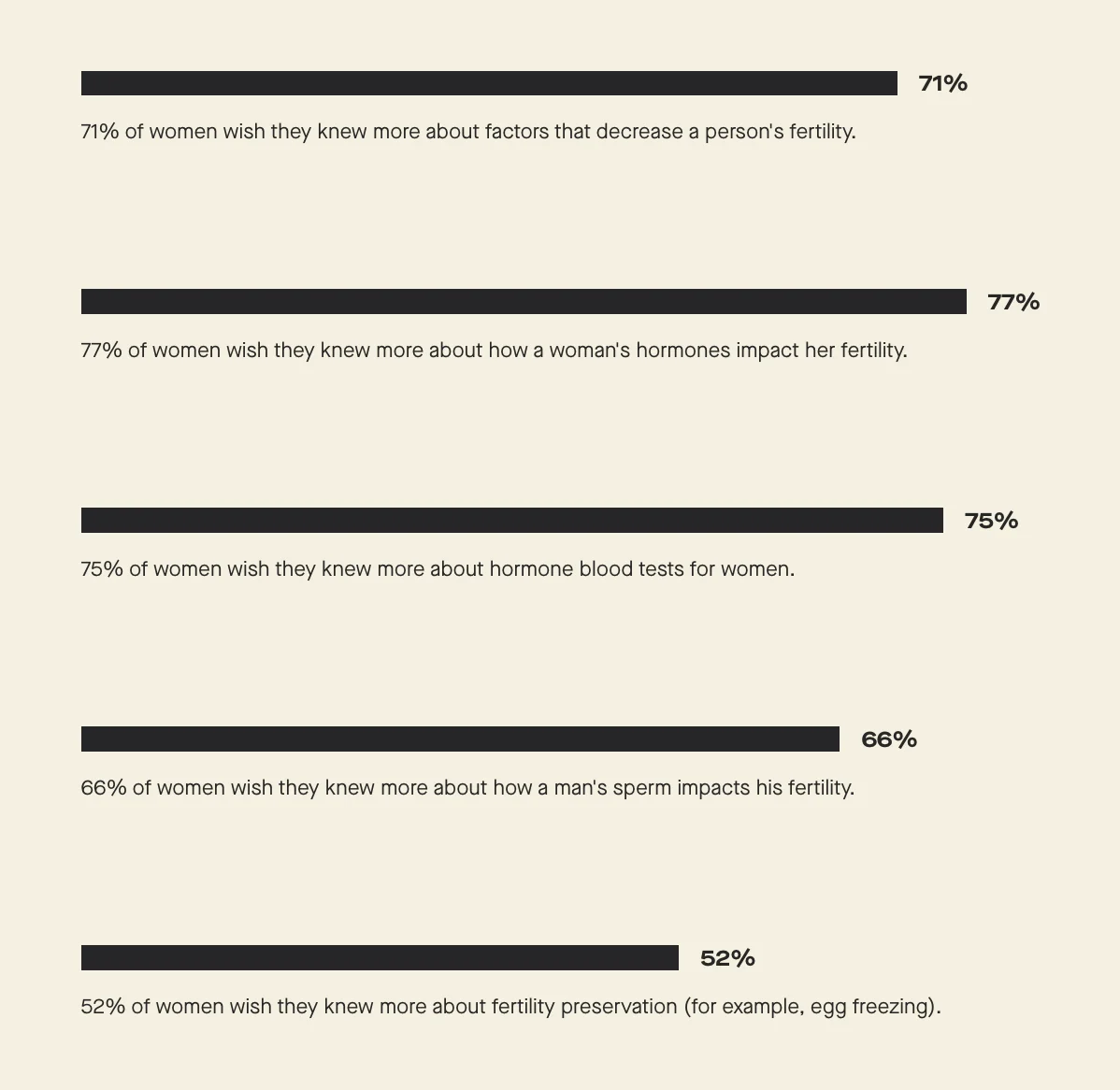
Information Channels
More women would like to receive fertility information from a specialist, but the numbers don’t add up: there are only about 2,000 reproductive endocrinologists (fertility specialists) nationwide.
Today, most women currently receive their information about fertility from a general healthcare provider and health-focused websites.
Where women currently get info on fertility
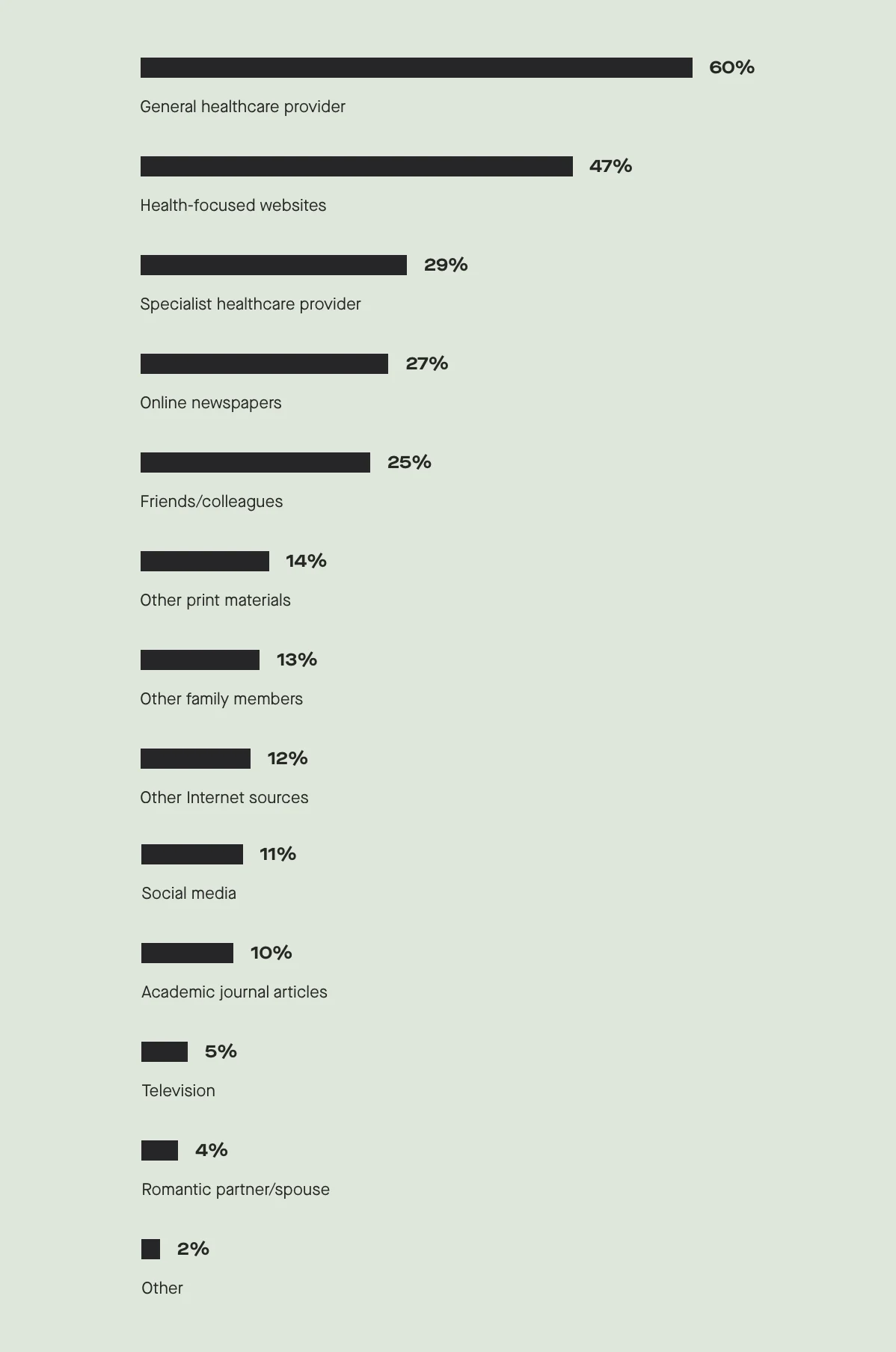
Where women want to get info on fertility
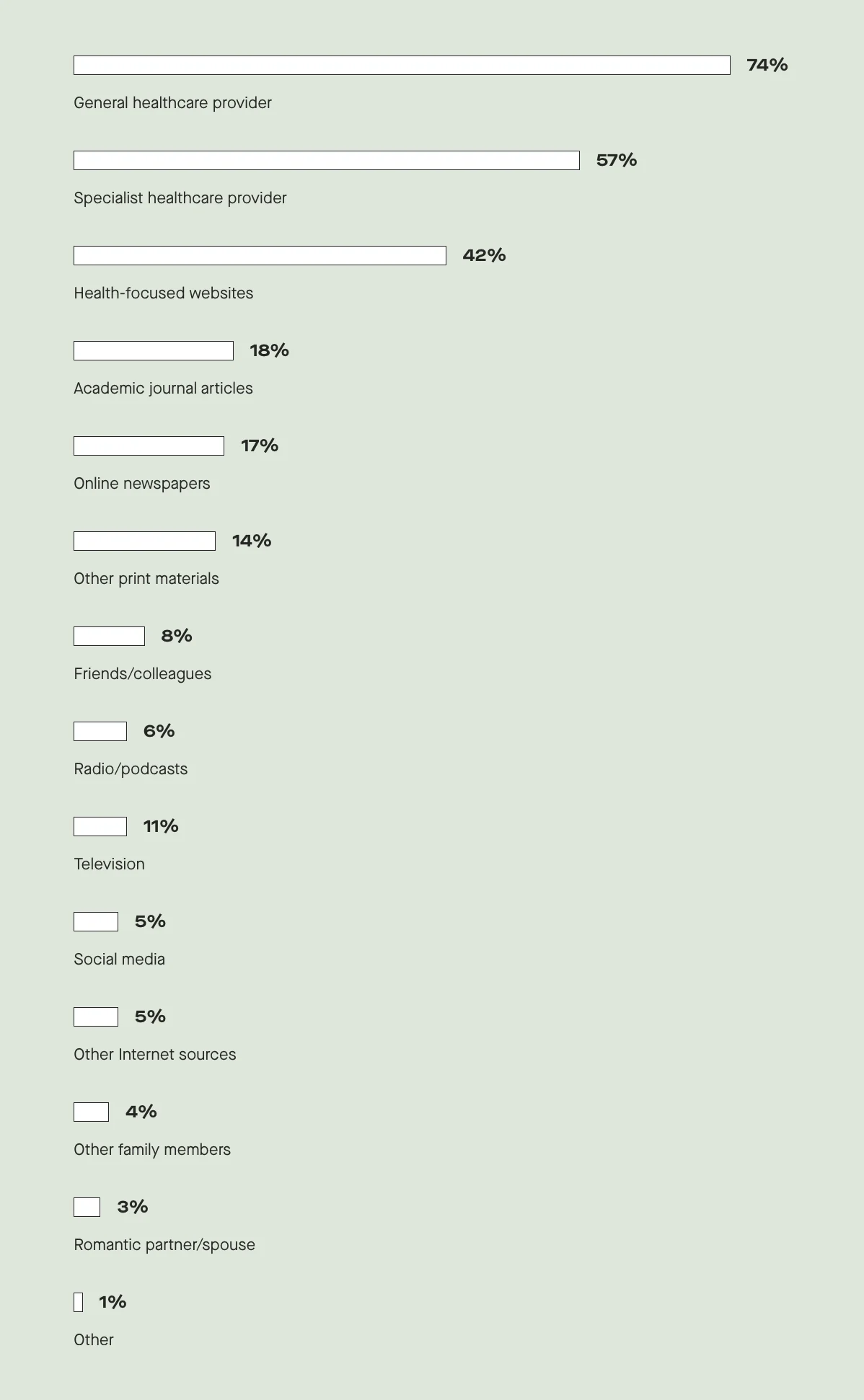
Emotions
Feeling interested, anxious and stressed about your fertility? Turns out, you’re not alone.

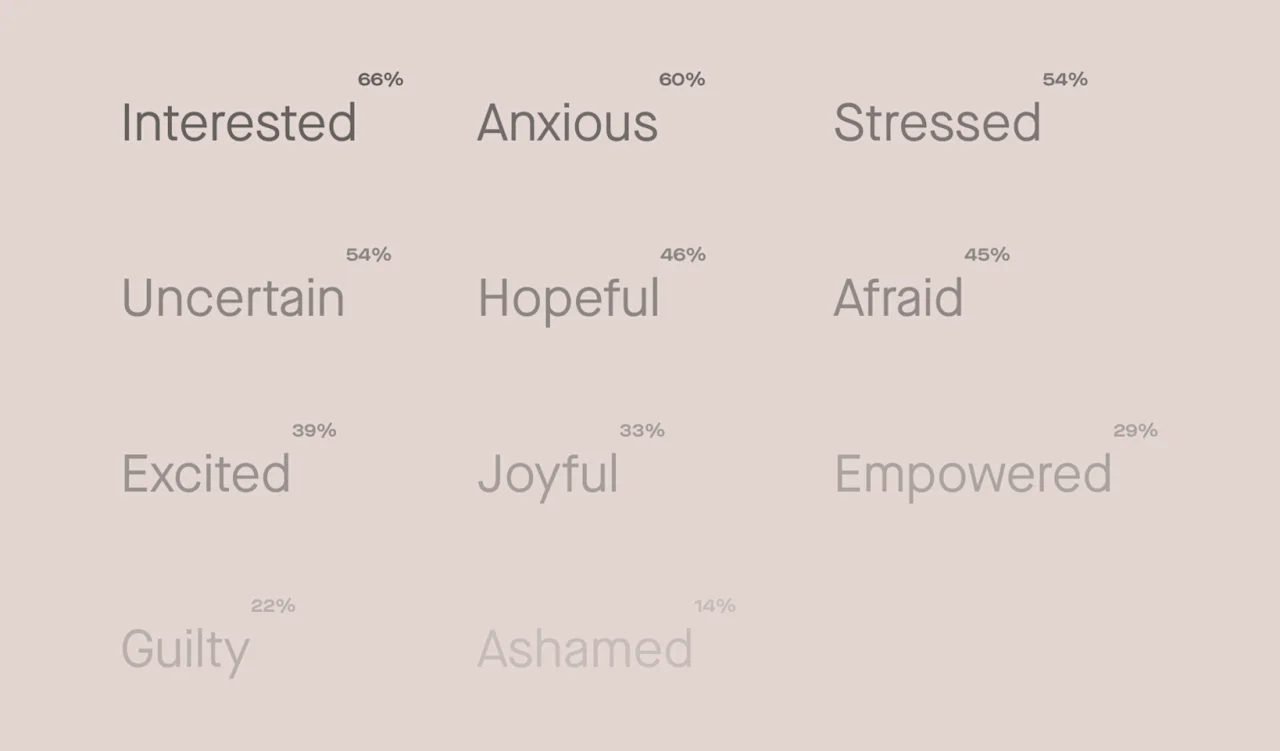
“Most people assume I don't want to have children and have considered me selfish. We are currently going through round 3 of IVF.”
Insurance and Fertility
Women think it is important for their insurance to cover annual fertility testing and infertility treatments.
The majority of women would choose an employer that provides these benefits over one that does not.
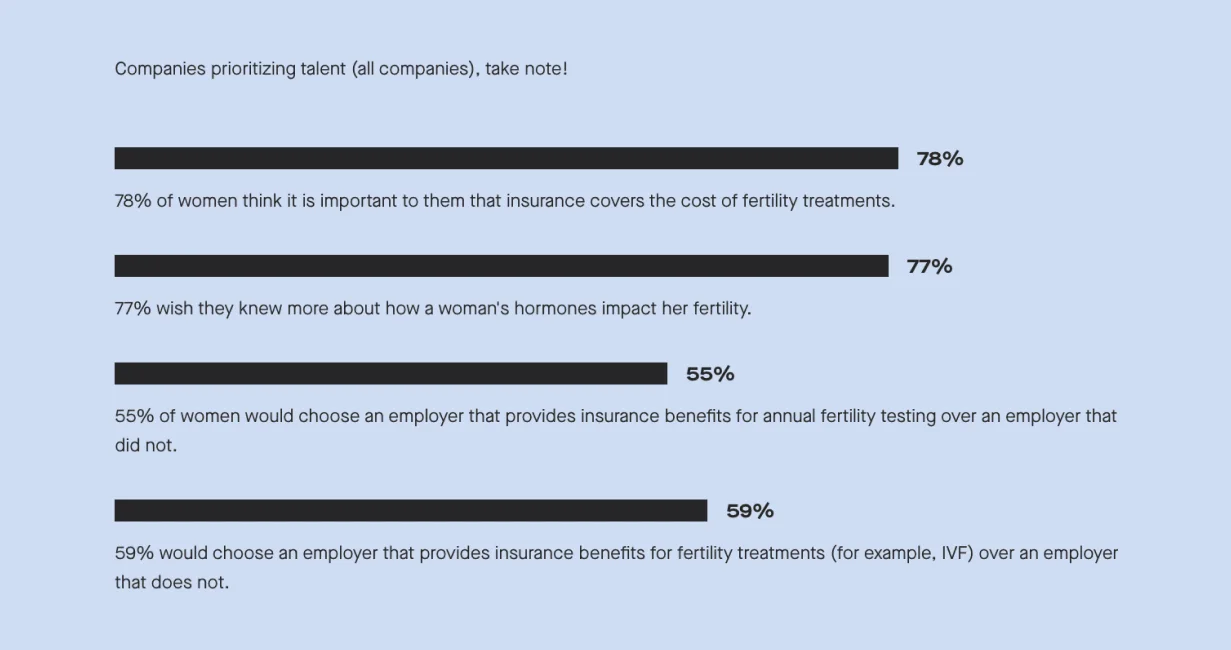
Infertility Stigma
Fertility stigmas prevail. Women believe that stigmas associated with fertility are worse for them than they are for men, except for when it comes to looking after children.
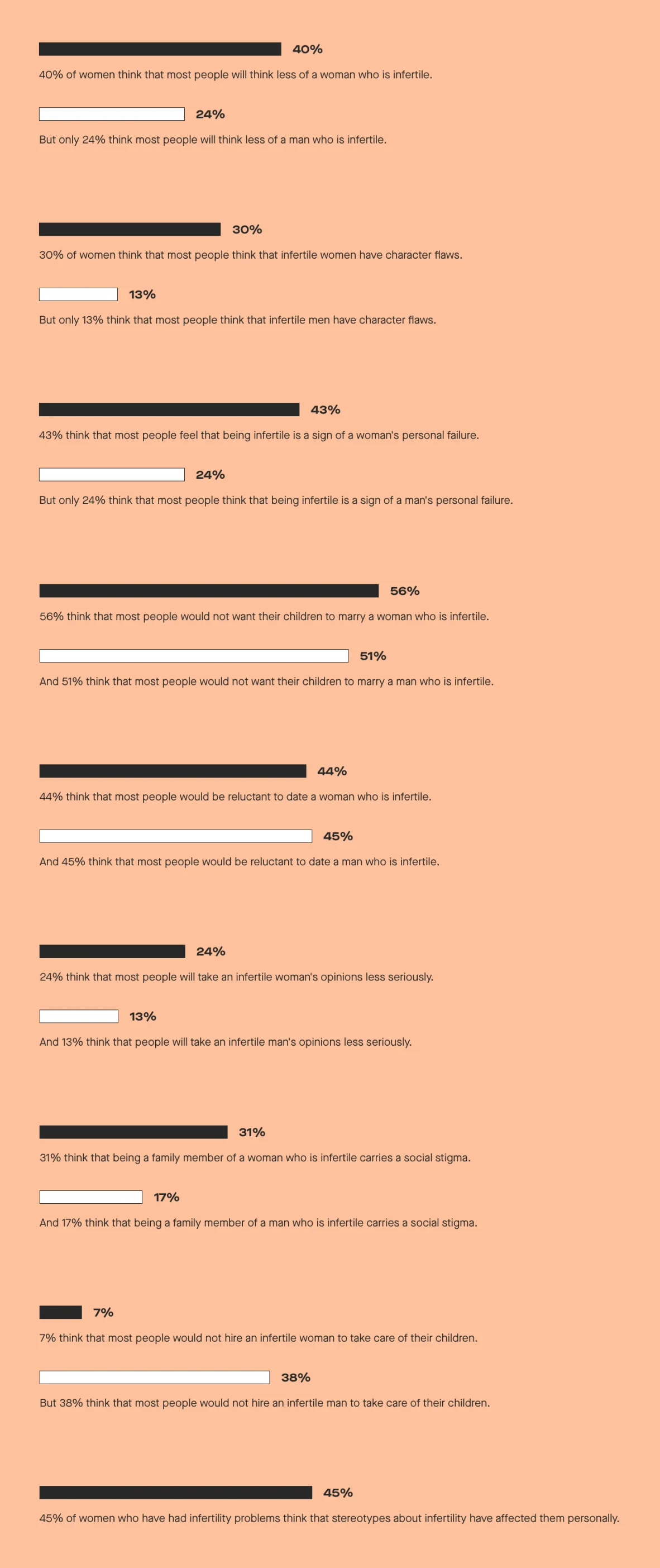
“Most were asking why we didn't have children yet, or saying I better have a baby soon before I'm too old. Maybe if I had shared what I was going through, it would have made the situation more bearable.”
Home Fertility Tests
While stigmas reflect long-held negative sentiments, women generally have positive attitudes and perceptions when it comes to innovations in fertility care testing and treatment options.
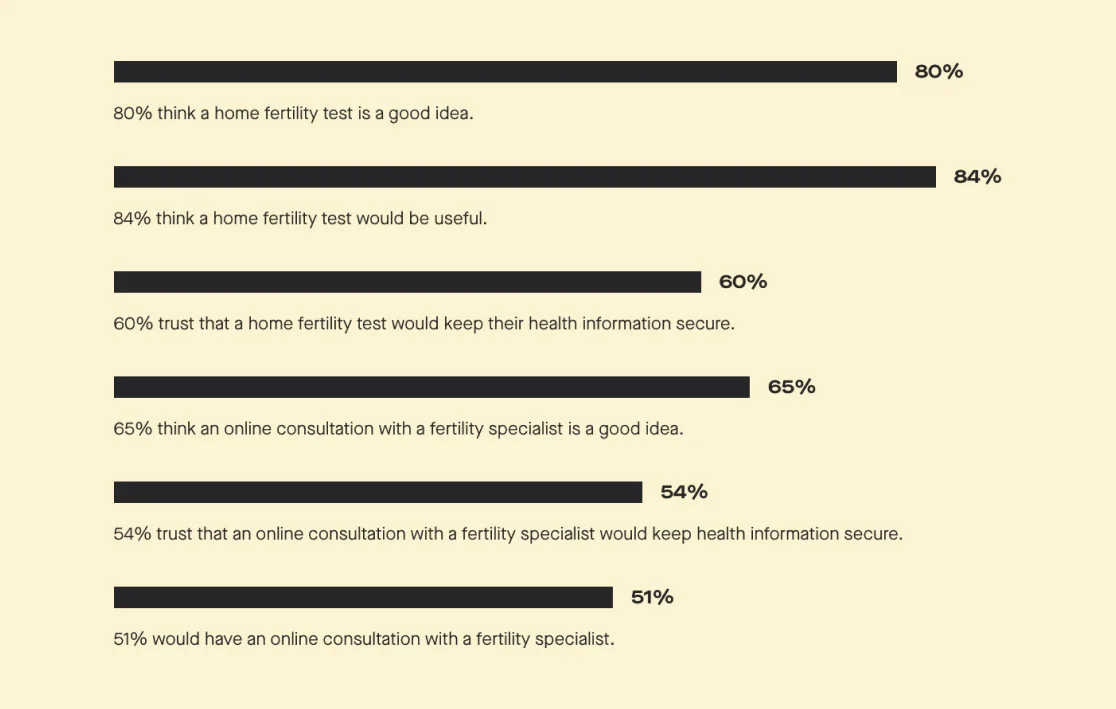
I had a guy come to our five bedroom house with a basketball court to look at a bee problem we were having. He had his young son along, who immediately and repeatedly asked where our kids were and why I didn’t have any. The bee guy was clearly embarrassed.
Intent to Take Action
Give women information impacting their bodies and futures, and more often than not, they’ll take charge and make changes.
If women knew that they had fewer eggs than average for their age, what would they do?
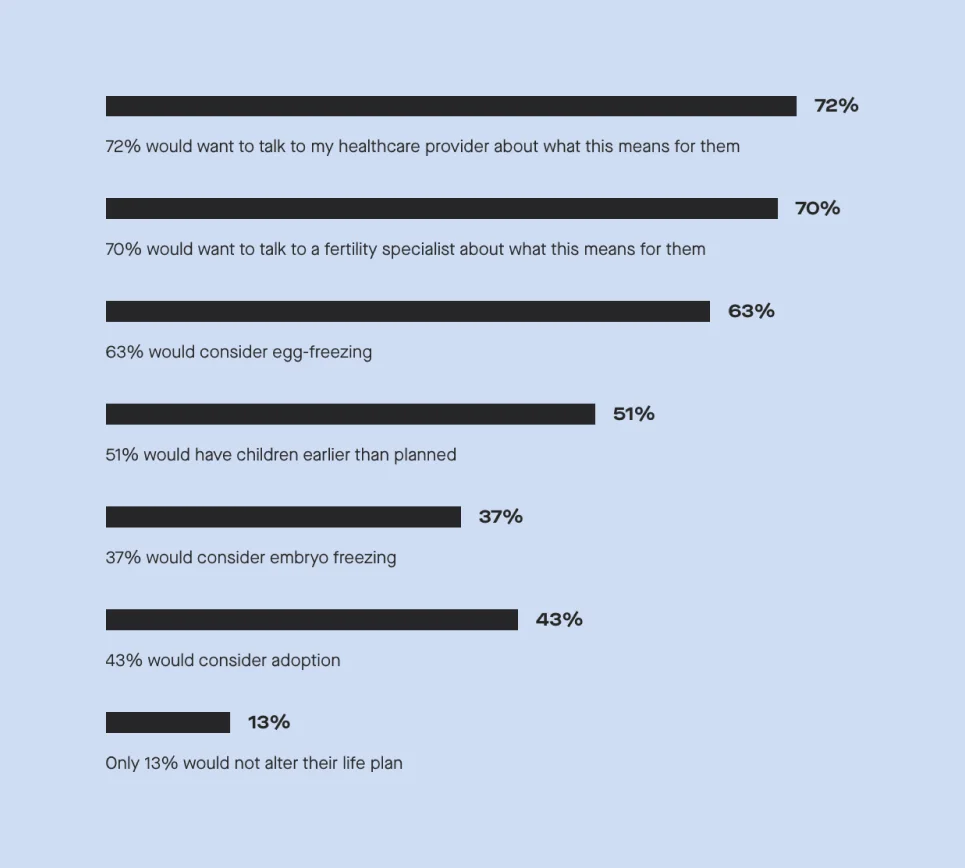
Methodology
This research was conducted by Modern Fertility’s research team and was approved by an Institutional Review Board (IRB), ensuring the highest ethical standards for human research. This study was conducted as a cross-sectional survey to discover what women currently understand about fertility. A cross-sectional survey means that we gathered the data at a single point in time and did not attempt to change or alter their beliefs in any way when gathering the data.
So, what can - and can’t - this type of study tell us? A cross-sectional survey is a great way to learn about the number of women who hold certain beliefs and uncover the correlational relationships between those beliefs. This type of study can’t tell us anything about causation.
Importantly, we wanted to make sure we conducted this study in the most accurate and scientifically sound way possible. Modern Fertility’s research team, comprised of PhD researchers and fertility and reproductive medical specialists, is committed to using the highest standards in academic research. We obtained Institutional Review Board (IRB) approval of our study protocol, which ensures we met ethical standards in human research. We also used reliable and validated measures and statistical analyses.
Demographics
The women ranged in age from 18 to 59 (M = 34.11, SD = 6.64).
The majority of the women indicated that they are hetersexual/straight (95.1%); 4.6% indicated they are bi-sexual, and 0.3% indicated they are gay/lesbian.
Approximately 1/3 of the women (33%) indicated they had infertility problems.
Geographic Region | |
|---|---|
Northeast | 19.0% |
South | 30.9% |
Midwest | 18.3% |
West | 29.7% |
Pacific | 0% |
Did not indicate | 1.5% |
Education | |
|---|---|
Less than high school | 0.3% |
High school graduate | 1.8% |
Some college | 11.9% |
2 year degree | 4.3% |
4 year degree | 41.6% |
Attended and/or completed graduate school | 40.1% |
Racial/Ethnic Background | |
|---|---|
Note: could select more than one | |
American Indian or Alaskan | 0.6% |
Asian | 5.5% |
Black or African American | 8.6% |
Native Hawaiian or Other Pacific Islander | 0.9% |
White | 75.84% |
Hispanic or Latino | 13.46% |
Other | 1.8% |
Prefer not to say | 0.9% |

